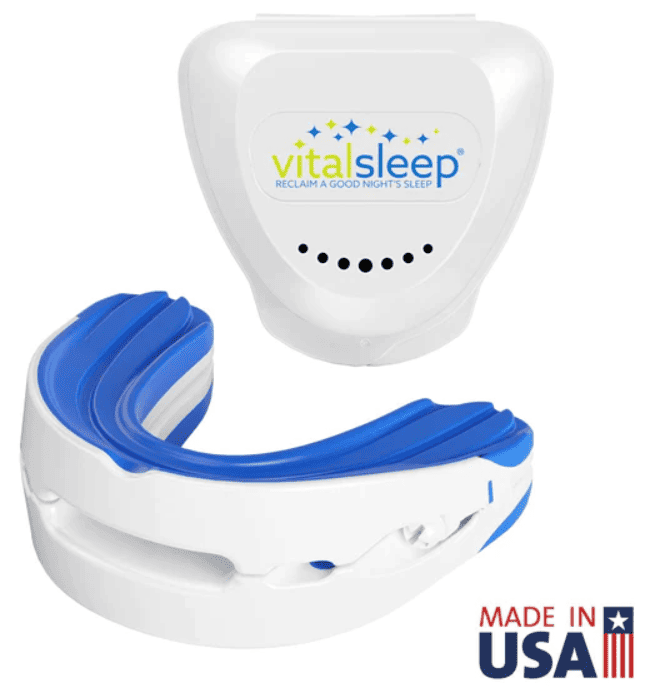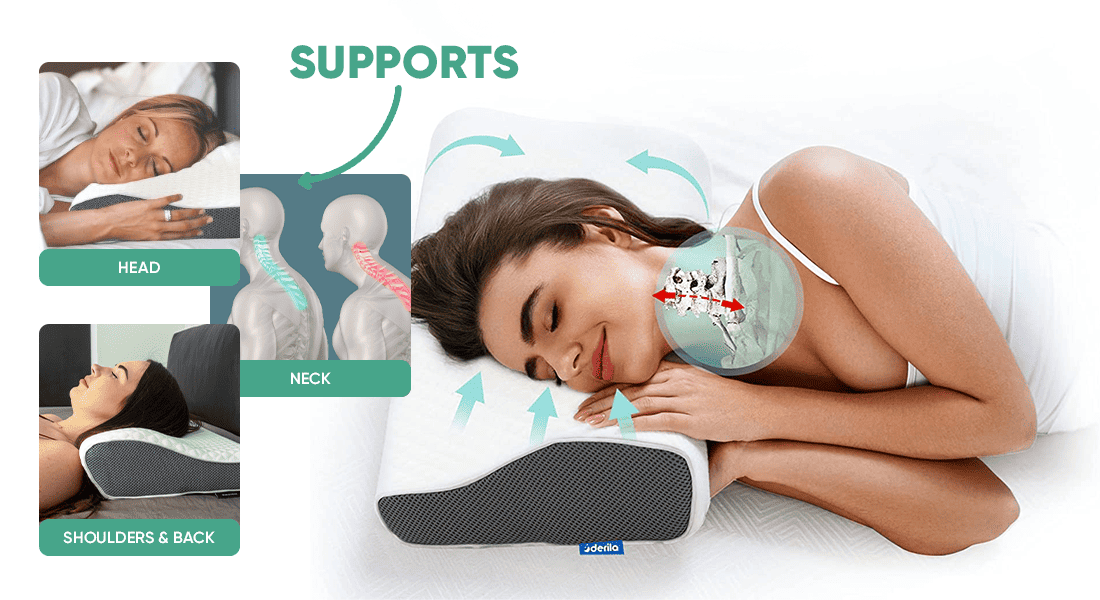Sufficient REM (Rapid Eye Movement) sleep is crucial for various cognitive and emotional functions. It’s a sleep phase that enhances memory consolidation, learning enhancement, and emotional regulation. Striving for adequate REM sleep duration as part of a balanced sleep cycle contributes to overall mental well-being and cognitive function.
Enhancing REM sleep duration and quality can be achieved through various lifestyle adjustments and habits. Follow along to learn about different ways to get more REM sleep and wake up feeling refreshed and mentally rejuvenated.
Key Takeaways
- Snore Fix: Use a mouthpiece (Vitalsleep) to address sleep apnea and improve REM sleep quality.
- Pillow Upgrade: Invest in an ergonomic pillow (Derila) for better neck support and deeper REM cycles.
- Sleep Routine: Maintain a consistent sleep schedule to optimize REM sleep duration and quality.
- Relaxing Environment: Create a cool, dark, quiet bedroom with calming scents and minimize screen time before bed.
- Healthy Habits: Avoid stimulants like caffeine and alcohol, manage stress, exercise regularly, and eat a REM-friendly diet (magnesium-rich, avoid stimulants).
- Bonus: Melatonin may increase REM sleep duration, and seeking professional help is recommended if issues persist.
Table of Contents:
What Is REM Sleep?
On average, a person completes 3-5 sleep cycles through the night. Each cycle consists of three Non-Rapid Eye Movement (NREM) stages and a single Rapid Eye Movement (REM) stage. The REM stage comes right after the stage of deep sleep during the night (NREM stage 3) in each sleep cycle.
The REM stage is characterized by muscle relaxation, quick eye movements, irregular breathing, increased heart rate, and heightened brain activity akin to wakefulness.
REM sleep involves increased activity in critical brain regions, stimulating learning-related areas like the cerebral cortex. As per a study from Sleep Journal by Oxford Academic, several brain structures, including the pontine tegmentum, thalamus, and hippocampus, enhance their activity during REM sleep. This heightened brain activity fosters memory consolidation and learning processes.
Insufficient REM sleep weakens immunity and affects synaptic maintenance, impacting memory formation. Prioritizing adequate REM sleep is essential for cognitive function, concentration, mood regulation, insightful thinking, and associative learning, ensuring overall health and well-being.
What Causes Lack of REM Sleep
- Mood disorders: Anxiety, depression, and PTSD.
- Sleep disorders: Sleep apnea, narcolepsy, and REM sleep behavior disorder.
- Neurodegenerative disorders: Parkinson’s disease, multisystem atrophy, and diffuse Lewy body dementia.
- Certain medications: Tricyclic antidepressants and serotonin reuptake inhibitors.
- Sleep disturbances: Disruptions caused by alcohol, caffeine, tobacco, and other sleep disorders.
How To Increase REM Sleep
Usage of Mouthpiece Device
If you snore, using a chinstrap or mouthpiece is highly recommended to enhance sleep quality, particularly during crucial stages like REM sleep. If we compare these two options, custom mouthpieces stand out as a better choice. A good quality mouthpiece, such as Vitalsleep, is designed to address snoring and sleep-related breathing issues specifically.
The design of the Vitalsleep device focuses on optimizing comfort and effectiveness, ensuring a more tranquil and beneficial sleep experience, notably during REM sleep. The easy-to-use mouthpiece is FDA-cleared and backed by a generous warranty.

The adjustable design of Vitalsleep gently advances your jaw to open your airway, reducing snores by up to 90%. Backed by a satisfaction guarantee, Vitalsleep ensures you breathe easy and sleep tight
100% MONEY-BACK GUARANTEE
Visit Vital SleepReplace Your Pillow
To improve your sleep quality, consider investing in an ergonomic pillow. This specialized pillow offers better neck support, reducing discomfort and ensuring a more restful sleep. An ergonomic pillow can also help prevent numb hands while sleeping, improving REM sleep and overall restfulness.

Derila is made from a memory foam material conforming to the shape of your head and neck. Ergonomic design supports the natural curvature of the spine reducing muscle pain, tension, and snoring
GET -70% DISCOUNT
Visit Vital SleepDevelop and Maintain a Sleep Schedule
Establishing and maintaining a consistent sleep schedule plays a pivotal role in ensuring quality REM sleep. One of the most notable oversleeping causes is an irregular sleeping pattern. It creates a vicious cycle that affects the duration and quality of REM sleep.
Overdoing sleep can shorten your REM cycles, depriving your brain of its vital nightly workout. By adhering to a steady sleep routine, you support your body’s ability to enter and maintain the essential REM stage, improving overall sleep quality and restfulness.
Creating a Sleep-Friendly Environment
- Maintain a room temperature between 60-67°F (15-19°C) to support optimal sleep. Adjust the thermostat or use bedding suitable for temperature control.
- The ideal humidity for sleeping comfortably through the night is around 30-50%. Consider a humidifier or dehumidifier to achieve the ideal balance.
- Use blackout curtains or an eye mask to ensure darkness, signaling your body that it’s time to sleep. Minimize exposure to artificial light from devices at least an hour before bedtime.
- Incorporate calming scents like lavender through essential oils, diffusers, or sprays to create a relaxing atmosphere conducive to sleep.
- Minimize disruptions with white noise machines or apps to drown out disturbances. Consider earplugs if external noise is unavoidable.
- Heavy bedding may be a cause of night sweats in men, disrupting REM sleep. Choose bedding that wicks moisture and supports your preferred sleep position.
- Keep the bedroom tidy and organized, associating the space with rest and relaxation.
- Develop calming pre-sleep routines like reading, meditation, or gentle stretching to signal your body that it’s time to wind down.
Limiting Stimulants Before Bed
In our tech-driven world, it’s tempting to scroll through social media or catch up on emails right before bed. But beware, those glowing screens might be sabotaging your sleep in a big way, particularly by impacting your precious REM sleep.
Electronic screens emit blue light that suppresses melatonin production, disrupting the body’s natural sleep-wake cycle. Engaging with devices before bed can stimulate the mind, making it harder to unwind and fall asleep.
Promoting a Calm Pre-Sleep Routine
Set a time to disconnect from electronics at least an hour before bedtime to cut down exposure to blue light. It’s better to replace screen time with relaxing activities like reading a book, immersing in a warm bath, or practicing gentle yoga or meditation. Lowering the overall lighting as bedtime approaches signals your body that it’s time to wind down.
Earplugs
Earplugs effectively minimize disruptive noises, creating a quieter sleep environment. They block unwanted sounds to facilitate a more peaceful and uninterrupted sleep, promoting deeper REM cycles.
Different materials offer different levels of noise reduction. Foam earplugs are the most common and affordable. Silicone and wax earplugs are more expensive but can be molded to your ear canal for a snug fit and better noise blocking.
Get Regular Exercise
Irregular sleep patterns, like waking up at 3 AM, might stem from inadequate or overly strenuous exercise schedules. Insufficient and excessive exercise routines can disrupt REM sleep, causing sleep fragmentation or difficulty achieving deeper stages.
Regular physical activity correlates with enhanced REM sleep, promoting deeper cycles and overall sleep quality. Suitable exercises like yoga or meditation contribute to relaxation, aiding in calming the mind for improved sleep.
Stress Management Techniques
The relationship between stress and REM sleep disruption is bidirectional, each influencing the other. Elevated stress levels can negatively impact sleep quality, including REM sleep. Conversely, inadequate REM sleep can intensify stress.
A study published in the journal Proceedings of the National Academy of Sciences concluded that the way REM sleep changed is linked to the regulation of corticosterone, the stress hormone.
Effective stress reduction techniques significantly contribute to improving sleep quality, especially REM sleep. Firstly, maintaining a consistent sleep schedule regulates the sleep-wake cycle. Restricting alcohol and caffeine intake and engaging in calming activities like meditation or reading before sleep reduces stress, facilitating improved REM sleep.
Dietary Practices for Better REM Sleep
The food you eat significantly affects your sleep cycle. Including magnesium-rich foods like nuts, seeds, and leafy greens in your diet may improve sleep quality. To make your sleep quality better, try including magnesium-rich foods like nuts, seeds, and leafy greens in your diet.
It’s also important to steer clear of alcohol, caffeine, and tobacco. It’s best to avoid them altogether, but you should at least avoid them close to bedtime, as they disrupt your sleep and shorten the REM stage.
Stop Taking Sleep Aids
The use of sleeping aids can lead to various side effects, such as impaired focus, feeling tired after sleeping, and reduced alertness the next day. You can also be susceptible to gastrointestinal effects like constipation, diarrhea, nausea, and dry mouth. Some individuals can be at a high risk of severe allergic reactions such as hives, itching, and swelling.
There’s also a risk of parasomnias, complex sleep behaviors like sleepwalking or sleep eating, associated with certain sleeping pills. Long-term usage may lead to tolerance and dependence, necessitating higher doses for the same effect.
Does Melatonin Increase REM Sleep?
Melatonin does play a role in increasing REM sleep. Research from The Journal of Clinical Endocrinology & Metabolism reveals that melatonin can extend the duration and consistency of REM sleep stages. As a hormone governing the sleep-wake cycle, melatonin rises in the evening with darkness, aiding sleep regulation and aligning the body’s circadian rhythm.
Conclusion
You can optimize REM sleep by following techniques like maintaining a consistent sleep schedule, reducing stress, and embracing a sleep-friendly environment. Avoid stimulants before bedtime and prioritize relaxation techniques. It’s important to note that if these steps don’t yield results, seek guidance from a healthcare professional to rule out any underlying causes.

